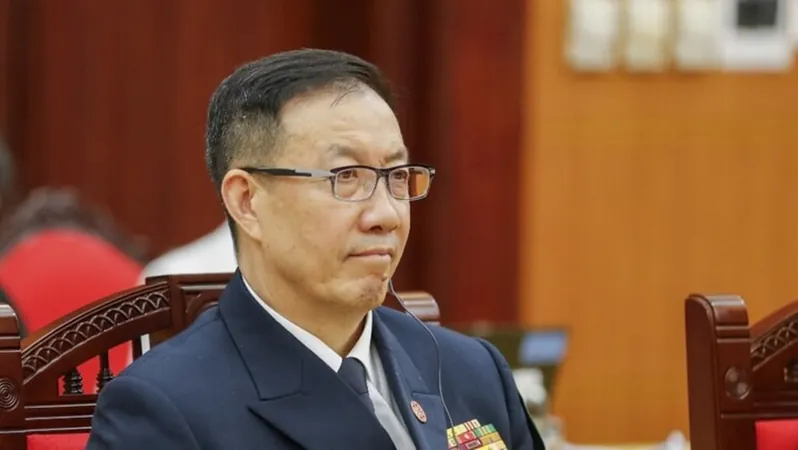
Why China’s Defence Minister Skipped the Shangri-La Dialogue: The Implications for Sino-US Relations
2025-05-30
Author: Daniel
In a surprising move, China has decided not to send its Defence Minister, Dong Jun, to this year’s Shangri-La Dialogue (SLD) in Singapore. This decision has raised eyebrows and prompted analysts to speculate about the broader implications for Sino-US relations amid escalating geopolitical tensions.
China's Strategic Withdrawal: What's Behind the Decision?
China’s Ministry of National Defense announced that a delegation from the People’s Liberation Army's National Defense University would attend in Dong's place, but provided no details on who would lead the group. This marks a notable shift, as it’s the first time China’s defence minister has not attended the SLD since 2019, a key staging ground for discussing sensitive issues such as Taiwan and the South China Sea.
Analysts suggest this absence is emblematic of a broader strategy by Beijing to limit ministerial-level engagement during tumultuous geopolitical times. Lim Tai Wei, an observer of East Asian affairs, pointed out that China’s participation level often reflects the prevailing international climate.
Cooling Ties: The Impact of US-China Relations
With Donald Trump back in power, experts speculate that China perceives minimal strategic benefit in sending its top defence official, especially with the newly appointed US Defense Secretary Pete Hegseth attending the forum. The lack of high-level attendance implies Beijing is choosing to forgo opportunities for crucial bilateral meetings with US counterparts.
The Preference for Controlled Narratives
Lim noted that the optics of such a high-profile meeting could be unfavorable for China, leading to the decision to send a lower-level delegation. In a high-context political culture, where non-verbal cues and atmospherics hold significant value, China may prefer to control the narrative rather than expose itself to potentially negative framing from Western audiences.
Adding to the complexity, Benjamin Ho from the S Rajaratnam School of International Studies explained that historically, China has sent its defence ministers only when conditions seemed conducive for engagement with the US.
Is Dong Under Investigation?
The absence has sparked rumors about Dong's status amid an ongoing anti-corruption campaign targeting Chinese military leaders. While suspicions have circulated about his potential involvement in a disciplinary probe, analysts urge caution. Dong’s recent meetings with German officials and discussions with Thailand’s Chief of Defense Forces suggest he remains active in his role.
Shifting Diplomatic Strategies: Testing the Waters?
According to Lin Ying-yu from Tamkang University, China’s decision may stem from internal uncertainty on how to handle defense diplomacy in light of Trump’s second term. By sending a lower-level delegation, China can observe US responses without fully committing itself to a high-stakes encounter.
The Cost of Absence: Missed Opportunities for Engagement
The Shangri-La Dialogue is a significant platform where countries engage directly with Chinese defence officials, facilitating open discussions that can influence diplomatic relations. Dong's absence means a missed opportunity for important interactions, representing a calculated risk for China.
While experts indicate that both nations can find other channels for communication, Ho emphasized that not attending the SLD was a significant opportunity loss for China.
The Control of Narrative Matters
Thompson concluded that China's decision to avoid the SLD may reflect a deeper dissatisfaction with the forum itself, where they feel their narrative is often overshadowed. By choosing to skip the event, China may also be sending a message about its preferences for a more controlled diplomatic environment, such as the Xiangshan Forum, its alternative security platform.
Ultimately, Dong Jun's absence from the Shangri-La Dialogue represents not just a gap in representation but a strategic decision influenced by the current geopolitical landscape.




 Brasil (PT)
Brasil (PT)
 Canada (EN)
Canada (EN)
 Chile (ES)
Chile (ES)
 Česko (CS)
Česko (CS)
 대한민국 (KO)
대한민국 (KO)
 España (ES)
España (ES)
 France (FR)
France (FR)
 Hong Kong (EN)
Hong Kong (EN)
 Italia (IT)
Italia (IT)
 日本 (JA)
日本 (JA)
 Magyarország (HU)
Magyarország (HU)
 Norge (NO)
Norge (NO)
 Polska (PL)
Polska (PL)
 Schweiz (DE)
Schweiz (DE)
 Singapore (EN)
Singapore (EN)
 Sverige (SV)
Sverige (SV)
 Suomi (FI)
Suomi (FI)
 Türkiye (TR)
Türkiye (TR)
 الإمارات العربية المتحدة (AR)
الإمارات العربية المتحدة (AR)